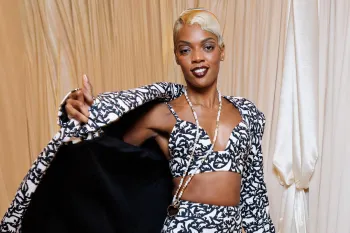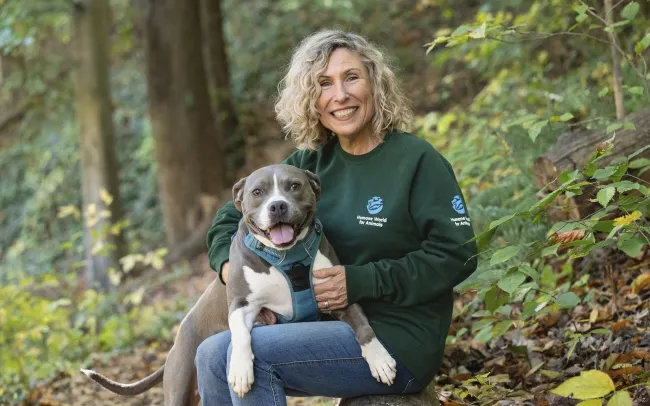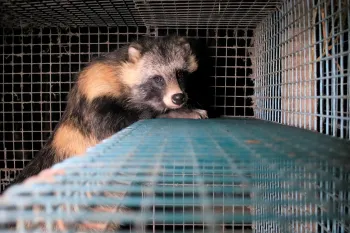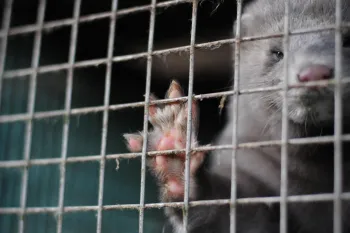Creativity, innovation and beauty—that’s what we celebrated during New York Fashion Week this year.
Animals were front and center at this year’s events, thanks to Christian Siriano. The designer, who also helped us launch our rebrand earlier this year by creating a special Humane World for Animals signature print, styled three exclusive garments that use a black-and-white version of this animal-forward print for his New York Fashion Week show. A bra, coat and pants using this print celebrated animals on the runway.
And later this month, we’re partnering with Harlem Fashion Row and Khary Simon for a panel about animal welfare and sustainability within the Black fashion community as part of NYC Climate Week.
Not so long ago, these kinds of events would have been considered fringe rather than mainstream. I remember how for years fashion was almost synonymous with callous indifference to animal cruelty. Models paraded down the runway dressed in fur that, to those of us who had seen the horrific realities of fur factory farms, represented immense suffering. It was clear to only some of us back then that fashion built on suffering has no place in a humane world.
Today, thanks to tireless campaigning to raise awareness of this cruelty, fur is on its death bed. Dozens of well-known fashion brands and retailers worldwide have committed to being fur-free because they recognize that fur is ethically indefensible and therefore increasingly unmarketable. Most leading designers—including Saint Laurent, Gucci, Alexander McQueen, Balenciaga, Valentino, Prada, Armani, Versace, Michael Kors, Jimmy Choo, DKNY, Burberry, Max Mara and Chanel—have fur-free policies. Instead of using fur, fashion brands are innovating with sustainable, cruelty-free alternatives.
So many people have learned that there is no way to make raising and killing animals for their fur anything but abhorrently cruel to animals—and a health risk to people everywhere. Recent years have shown that these places are cesspools of disease; there have been alarming outbreaks of COVID-19 and highly pathogenic avian influenza on more than 500 fur factory farms in Europe and North America. Our investigations have time and again exposed even so-called “high welfare” fur farms as extremely cruel facilities where animals are kept in small, barren cages for their entire lives, suffering from raw, open wounds and infections before being electrocuted or gassed to death before being skinned.
Demand for fur products continues to drop all over the world. No longer a status symbol but a glaring ethical faux pas, wearing fur cannot be considered luxurious in any way. And increasingly policymakers in many countries and communities are restricting the production or sale of fur because cruelty, environmental damage and risk to public health are inherent to the fur trade.
Further, in July, the European Food Safety Authority concluded in its official scientific opinion that fur factory farming across the European Union fails to meet basic animal welfare needs for mink, foxes, raccoon dogs and chinchillas. Those few brands who still continue to use and sell fur need to urgently reflect on these findings, and do the right thing by stepping away from this cruelty now.
The decline of fur has been astounding, but we will not stop fighting fur until it’s gone for good. In the last decade, the number of animals confined and killed on fur factory farms globally has decreased from approximately 140 million animals in 2014 to around 20 million in 2023—that’s an 85% decline. Still, 20 million animals being killed every year solely for their fur is 20 million too many, we are determined to achieve more fur-free policies and more fur sales bans to stop fur from ever making a comeback and end this cruel trade for good.
I firmly believe that together we can create a world where fashion reflects compassion. By working with visionary designers, we can show the world that compassion and style go hand in hand. This is about more than fashion; it’s a statement that caring for animals is always in style.
You can be part of this humane-forward fashion movement by adding your name to a petition calling on Woolrich to become the next major fashion brand to end its use of fur.




